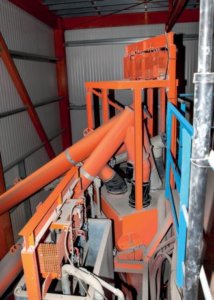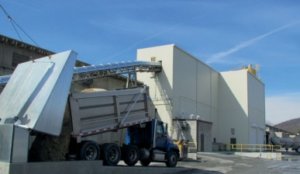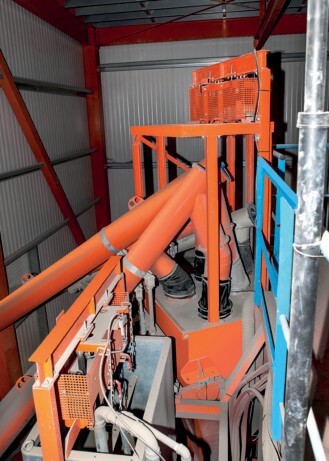NPP helps meet regional demand surge with state-of-art batch plant

Among the important investments made by Northeast Prestressed Products LLC over the past year as part of an $8 million plant upgrade program is the addition of a new computer-controlled concrete batching system with heated aggregate storage from Advanced Concrete Technologies (ACT). The investment – in response to a surge in new business over the past few years – also includes steerable trailers for transporting large precast beams, a 70-ton mobile crane, forms for precast concrete deck panels and box beams, and battery molds for precast bridge abutments.
The new 7,100-foot-long Goethals Bridge—scheduled for completion in 2018—is being built alongside the existing 90-year-old bridge. The new bridge will feature two three-lane cable-stayed spans across the Arthur Kill Strait from Elizabeth, New Jersey, to Staten Island, New York. NPP is providing the project with nearly 400 precast, prestressed concrete bulb-T beams measuring up to 178 feet long by eight feet high and weighing as much as 110 tons. The firm is also supplying the bridge project with more than 6,000 precast, prestressed partial-depth deck panels, each weighing up to two tons.
Search for a solution
In early 2015, NPP Vice President Fink and NPP president Thomas Koons attended trade shows and conducted other research to narrow down their search for a new concrete batching system. While several solutions were considered, the representatives from Advanced Concrete Technologies (ACT), of Greenland, New Hampshire, USA, made the strongest impression on the NPP selection team. NPP’s wish list for its new batch plant included:
- Move the batch plant outside the main production building to free up new production space under the plant’s main overhead crane
- Protect the new batch plant from the weather, including heated aggregate storage for all-weather production
- Provide significantly more storage capacity for aggregates, cementitious materials, and admixtures
- Provide a high shear mixer capable of producing high-performance concrete, including SCC, as well as consistent four cubic-yard output even when faced with variability in aggregate specific gravity and angularity
- Reduce batching cycle time and provide flexibility and increased mix distribution
- Provide a higher level of system automation, including the microwave moisture technology, in-depth batch history reporting, automated moisture control, maintenance reminders, and automated inventory tracking and reordering
- Reduce or eliminate overtime required for batch system cleanup.

ACT worked closely with NPP’s chosen local contractor, Kinsley Construction, Inc., of York, Pennsylvania, on the details of site preparation for the new batch plant. Site preparation included the construction of a large, steel-frame insulated enclosure to house the new batching system and aggregate storage bins. The new aggregate storage system was a critical project and required that multiple contractors and subcontractors work in close cooperation. “ACT was instrumental in helping us design the aggregate bin system,” Fink says. “They see many plants around the world and sell plants in cold environments, so their experience and recommendations really helped us.”
ACT engineers worked closely with NPP and mechanical contractors James Craft & Son, Inc., of Manchester, Pennsylvania, to help specify and design the new aggregate storage system. The five-compartment aggregate storage system needed to be equipped with radiant heating capable of maintaining fine and coarse aggregates at approximately 65-75 degrees Fahrenheit. Craft & Son arrayed miles of radiant heat tubing over a bed of 6 -inch by 6-inch reinforcement wire mesh to provide a precast heated floor for the aggregate system. Craft also provided radiant heat controls, tubing manifolds, boilers, valves and other necessary components for the system (figure 8). The vertical aggregate bins were pre-cast in stackable panels and then assembled in their final position. The five compartments are capable of holding and conditioning a total of 600 tons of sand, stone and other aggregates.
Increased production and efficiency
The list of benefits derived from the capital investments made by NPP over the past 18 months is long. When it comes to its new batch plant, the key highlights include:
- Reclaimed approximately 3,000 square feet of valuable production space by placing its new batch plant in a weather-proof housing outside the building. This “new” production space directly enabled the firm to produce the 6,000 precast prestressed deck panels for the Goethals Bridge replacement project.
- Achieving high early strength sooner thanks to the increased energy and accuracy of the new batching system. “Usually two to four hours sooner, despite the fact that our clients require up to 10,000 psi at 28 days,” Dennis Fink observes. “We achieve from 9,500 to 13,000 psi within 24 hours in most cases. That level of early strength gives us the extra time we need for the complex set-up requirements and reinforcing details and still allows us to maintain our 24-hour production cycle. It has also given us greater flexibility to meet demanding delivery schedules when necessary.”
- Greater production output. The ACT MobilMat Mo4500 batching system has cut NPP’s batch cycle time in half, from ten minutes to about five minutes per batch. “What used to take us 10-12 hours, we can now do in a standard 8-hour shift,” explains Tom Koons. “That’s had a critical impact on our production capacity. We can produce more product every day and it has enabled us to expand, which is good for everyone.” Overall, NPP output has increased by 10,000 additional cubic yards concrete per year over the past five years—enough additional concrete to fill three Olympic swimming pools, every year.
- Increased production flexibility. Given the 50 percent faster cycle time of NPP’s new batching system and the faster exchange of crane buckets made possible by the ACT two-position crane bucket shuttle cart, the firm is able to not only pour individual beds faster but pour multiple beds simultaneously if need be. “We are able to pour different mixes one after the other,” Fink explains. “That’s one of the things the ACT computer system allows us to do. We can have two different mixes and one batch can go one direction and another batch can go to another project without skipping a beat. One after another after another. That wasn’t possible with our old batching system.”
- Reduced overtime. NPP’s new batch plant features an automated clean-out system that reduces mixer cleanup and maintenance demands. “With our old batch system, we would only wash out the mixer at the end of the day or end of a shift,” says Koons. “Concrete would continually build up inside the mixer so by the time you did cleanup you would need people to actually get in the mixer with jackhammers to get it out. We are running six days a week, which meant we’d have to bring in two guys on a Sunday at double time to do maintenance.” NPP is saving approximately $24,000 per year in overtime it no longer has to pay just to keep its batch plant clean.
- Improved accuracy and consistency. The WCS Control System in the ACT MobilMat batch plant provides NPP with greater batching accuracy, automated moisture measurement and compensation, detailed records of every batch produced, automated maintenance reminders, and automatic inventory tracking and reorder. NPP is now able to reliably and consistently produce any high-performance mix required by its demanding DOT and P3 clients, and produce SCC, which is saving on labor and providing consistent quality.
- Improved safety. Strict lockout systems and safety interlocks on the ACT MobilMat batch plant greatly reduce the chance of accidents. In addition, the automated scale calibration check system has eliminated the need for workers to place certified heights on a scale, which was required with the old batching system.
DOT milestone achieved
Another key milestone that NPP attributes to its new ACT batching system is the recent acceptance by one of the firm’s key customers of the new batch system’s automated moisture measurement and compensation using microwave probes in the aggregate bins and mixer. In the past, and continuing today for most DOT and P3 inspectors, a single moisture test is conducted at the start of a shift and entered into the batching system for use throughout the day.
“We’re offering our DOT and P3 partners a new, higher level of batching consistency and accuracy with continuous moisture monitoring and correction,” notes Dennis Fink. “With our new batching technology, you are placing your faith in science and technology rather than from a single moisture reading taken by a person from the bottom of a 120-ton aggregate bin. That single reading does not represent the entire bin. We can provide an accurate reading in real time to ensure that 100 percent of our batches meet the specified mix design.”
You can read the entire NPP Case Study here










